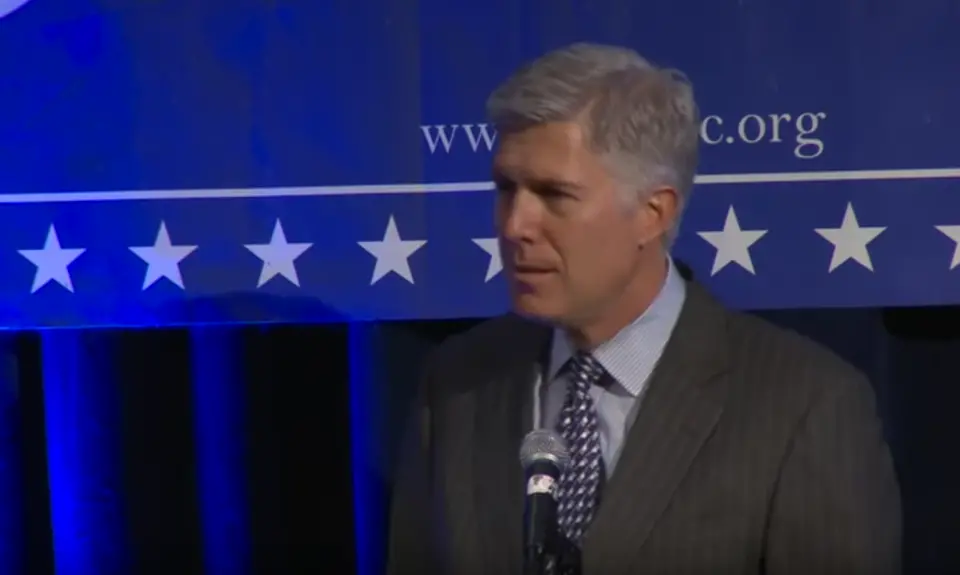President Trump announced today that he will nominate Tenth Circuit Judge Neil Gorsuch to the Supreme Court. Since being placed on the bench by George W. Bush, Gorsuch has built a troubling record of hostility to the rights of workers and consumers, and to women’s access to reproductive healthcare.
As our colleagues at People For the American Way and progressive allies write in a fact sheet on Gorsuch's record,
Judge Gorsuch is a far-right extremist who would manipulate his politically loaded version of ‘originalist’ methodology to overturn basic and well-established Supreme Court precedents and principles of American law and, most importantly, prevent the federal government from properly enforcing countless acts of Congress—for example, critical laws that ensure workers‘ rights and safety, guarantee equal opportunity, safeguard consumers and investors, ensure the safety of food and drugs, and protect our environment.
Notably, Judge Gorsuch has been critical of progressives who have brought constitutional challenges in the courts. In particular, Judge Gorsuch has harshly condemned those who have turned to the courts to advance LGBT equality, enforce church-state separation in the context of vouchers, and to address individual autonomy and the right to physician aid in dying. He claims this is inappropriately using the courts to debate public policy, ignoring courts‘ inherent responsibility to address constitutional challenges brought to them by injured parties and his own support for repeated challenges to the Affordable Care Act. In fact, when Gorsuch says courts should not address certain issues, what he really means is that they should address them, but issue conservative rulings. He also minimizes the critical role the courts have played in ensuring equality and the enforcement of critical constitutional values through landmark civil rights and women’s rights decisions.
This fact sheet compiles some of the lowlights of Gorsuch's career on the bench, including:
- Said corporations can deny birth control coverage to employees. Gorsuch joined the Tenth Circuit majority in the 2010 Hobby Lobby case, later affirmed by the Supreme Court, holding that corporations can cite religious beliefs to deny contraception coverage to employees. As the fact sheet notes, “The Hobby Lobby decision has been invoked not only to support curtailing employees’ access to reproductive health care but also to justify noncompliance with child labor laws; anti-kidnapping laws; and antidiscrimination laws."
- Displays a narrow, ideological view of workplace discrimination laws. As Elliot wrote last week, as a judge, Gorsuch "has consistently ruled against workers and in favor of big corporations. For example, he argued in dissent that the court should overturn a Department of Labor fine against a company whose failure to train a worker caused his death, and wrote an opinion holding that federal law did not even protect the in-house counsel of a state fire marshal from sex discrimination." He also he argued that a woman UPS driver should not be allowed to prove that she had faced sex discrimination.
- Shows a disturbing view of police brutality. In 2013, Gorsuch ruled that a police officer who killed a young man when he shot him in the head with a stun gun, contrary to his training manual, had not used unconstitutionally excessive force. Gorsuch wrote that the man, who fled police officers after admitting that some marijuana plants were his, “was resisting arrest by fleeing from officers after they identified themselves—even if the crime of which he was suspected was not itself a violent one, he was likely to be apprehended eventually, and he hadn't harmed anyone yet.”
- Has repeatedly ruled against the rights of disabled students. Gorsuch has authored a handful of opinions limiting the ability of disabled students to seek protection under the Americans with Disabilities Act and the Individuals with Disabilities Education Act, including holding that “a student with autism did not have a right under the federal Individuals with Disabilities Education Act (IDEA) to an education that would provide a chance to achieve intellectual and social skills outside the classroom” and that “even when a school violates a student's rights under the IDEA, the student may still be entitled to no remedy for an IDEA violation if the student leaves the school out of frustration with the school‘s continuous failure to follow the IDEA.”
- Wants to make it harder for agencies to enforce laws passed by Congress. The backgrounder explains how Gorsuch opposes the critical Chevron doctrine: “Gorsuch would make it more difficult for agencies to enforce laws that keep our air and water clean and safe; that ensure our food and medicine are safe; that protect essential workers‘ rights; and that safeguard consumers and investors. …“[H]e embraces a philosophy that courts should be able to overrule the agency experts when it comes to their important work in enforcing regulations. It is difficult to overstate the damage this would cause to our nation. Eliminating this principle, known as the Chevron doctrine, would tie the hands of precisely those entities that Congress has recognized have the depth and experience to enforce critical laws, safeguard essential protections, and ensure the safety of the American people. Importantly, the agency leaders whose expertise Gorsuch would dismiss are answerable to the people‘s elected representatives in Congress, and anything they do can be overridden by statute.”






